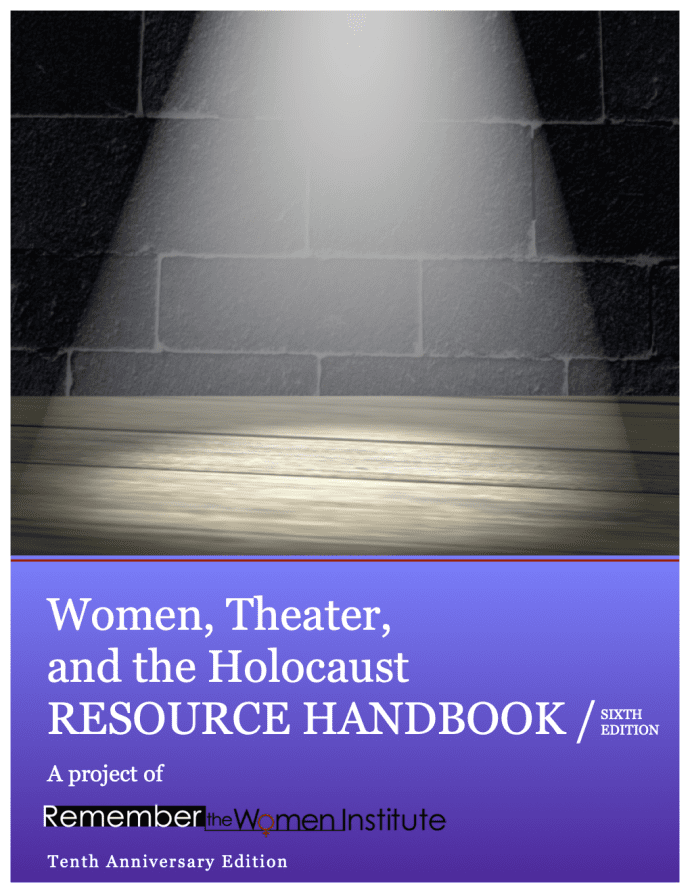Theater has the power to make history more alive for viewers, whether it is strictly factual or evokes the spirit of what actually transpired. This resource handbook, with plays by and about women that were written and presented from the time of the Holocaust until today, helps us to better understand the experiences that women suffered as women.
First published in 2015, the newly interactive sixth edition is available as a free PDF. Following an introduction by Dr. Rochelle G. Saidel, Section 1 is an annotated bibliography with three parts: Part 1 lists plays about women and the Holocaust; Part 2 lists plays about the Holocaust by women; and Part 3 lists books about women, theater, and the Holocaust. The listings have numerous additional and updated entries from the past two years. Section 2 of this resource handbook offers ten personal essays, one of which is new, describing the creation and staging of theatrical works about women and the Holocaust. In alphabetical order, the essays are written by: Dr. Meghan Brodie, Cynthia L. Cooper, Dr. Patrick Henry, Dr. Velina Hasu Houston, Susan B. Katz, Dr. Julia Pascal, Naomi Patz, Dr. Rochelle G. Saidel, and Dr. Alice Shalvi.
- Dr. Meghan Brodie, Assistant Professor of Theater, Ursinus College, describes her experience working with her students at the University of Southern Maine on In the Underworld, a play about Ravensbrück women’s concentration camp translated from camp political prisoner Germaine Tillion’s Le Verfügbar aux Enfers.
- In her second essay, Dr. Meghan Brodie, member of Remember the Women Institute’s Women, Theater and the Holocaust team, comments on industry-wide conversations about who should be cast in what roles across theater, film, and television.
- Cynthia L. Cooper, award-winning playwright and member of Remember the Women Institute’s Women, Theater and the Holocaust team, details how she became engaged with the story of Gisa Peiper, a young Jewish member of the resistance in Hamburg, and how she carried out research on site in Hamburg and elsewhere to create her play, Silence Not, A Love Story.
- Dr. Patrick Henry, Professor Emeritus at Whitman College, Walla Walla, Washington, tells us about the play he wrote based on political prisoner Charlotte Delbo’s Auschwitz and After.
- Dr. Velina Hasu Houston, Distinguished Professor of Theatre, University of Southern California, shares how her Japanese upbringing intersects with World War II history, particularly Jewish and Japanese relations in Kobe, Japan, the city in which Dr. Houston’s parents met.
- Susan B. Katz, playwright and social worker, describes writing her play Courage Untold, about the women who took part in the October 1944 prisoners’ uprising in Auschwitz-Birkenau.
- Dr. Julia Pascal, award-winning British playwright,reflects on her inspiration for As Happy as God in France.
- Naomi Patz, playwright and educator,discusses how she reconstructed and reimagined her version of The Last Cyclist from a cabaret originally penned in the Terezín Ghetto in 1944.
- Dr. Rochelle G. Saidel, founding director of Remember the Women Institute, writes a tribute to Nava Semel and her work.
- Dr. Alice Shalvi, an Israel Prize awardee for Lifetime Achievement, writes about the initiation and implementation of Refidim Junction, a musical theater piece that originated with the discovery of letters written by her mother in 1930s Germany.
Section 3 offers teachers an outline frame, created by Karen Shulman, educational consultant for Remember the Women Institute, and David Druce, social studies teacher, for a study plan that uses theater to teach about women in the Holocaust.
Funding for the sixth edition of the Women, Theater, and the Holocaust Resource Handbook was generously provided by Patti Askwith Kenner and the Five Millers Family Foundation. We welcome reader recommendations for additions to the bibliographies, as well as other essays and lesson plans about women, theater, and the Holocaust. Suggestions can be sent to [email protected].

